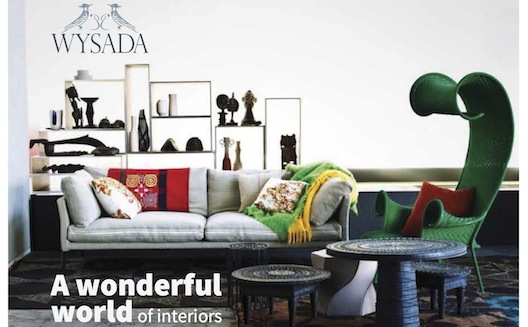Jordan's Wysada to Launch One Kings Lane Clone for the Middle East

 You’ve heard of Desado.
Now meet Wysada.com, the
Jordan-based One Kings Lane clone launching in the Middle East.
You’ve heard of Desado.
Now meet Wysada.com, the
Jordan-based One Kings Lane clone launching in the Middle East.
Set to go live in December, the site (whose name means “cushion” in
Arabic) will offer designer home accessories and decorations to
serve what they’re betting is a hungry market for home goods in the
UAE, Saudi Arabia, and Jordan.
With $4 billion spent on furniture in Saudi Arabia and the UAE
alone in 2011, and an estimated $715 million to be spent on
residential interior outfitting in Saudi next year, Wysada’s
founders are hoping to take the trend online, they revealed in a
chat at their modern steel-and-glass office in Sweifieh, Amman’s
outdoor shopping district.
“It’s a proven model in the U.S.,” says CEO Mohammed Musleh. That
much has been clear ever since One Kings Lane lured 4 million users
in 3 years, Fab snapped up 5 million users in a year and a half,
and both grew to a combined yearly revenue of around $300 million,
thanks to a great user interface, popular products, and strategic
advertising.
But, unlike the entrepreneur in our
”pitchfail” article, Musleh and his 25-strong Wysada team
aren’t naïve about the fact that they will work hard to localize
the model in the Arab world.
To bring a similar Fab.com concept to the region, competitor Desado
is banking on a “smart consignment” model, that will force vendors
around the globe to ship their items to a local Dubai warehouse
before product go live on the site. Wysada has a different take,
planning on investing directly in inventory for one.
Here’s Wysada’s game plan:
- An international presence. With a main hub in
Dubai, they also have offices in London, Hong Kong, Istanbul, to
source goods from Europe, Asia, and the Middle East, respectively.
“Over 75% of goods will be from outside the region, while 25% will
be from the Middle East,” says Musleh.
- Launching in three markets. Rather than start
by testing the waters in the UAE, as Namshi has done, wisely,
Wysada is going big, and wasting no time going for the region’s
biggest market. UAE, Saudi, and Jordan will be live from launch
day.
- Investing in inventory. To minimize drop
shipments (those shipped upon demand once the item is ordered),
Wysada is buying products directly and shipping them to its central
warehouse in Dubai. The site already has thousands of brands on
board with online exclusivity agreements, says Musleh.
- A focus on smaller interior homeware items.
Focusing mostly on large, bulky furniture items could be risky in
this market; wisely, Wysada is planning for 75% of its sales to be
from accessories, and about 25% from furniture. Bigger items will
still be stored locally.
- In-house photography. Gorgeous, enticing
photos are a necessary weapon in the designer e-commerce business,
and a known key to the success of Turkish flash sales site
Trendyol. Smartly, Wysada will add this tool to its arsenal, taking
its own photos of product samples in its London office and
studio.
- Smart cash on delivery (COD). In Saudi Arabia, where COD rates can soar to 80% and return rates can reach 25%, e-commerce companies have to get smart about payment and warehousing policies to avoid eating the cost of two-way international shipments. Like any sensible venture, Wysada plans on warehousing locally in its markets, while instituting an active COD policy. “We’ll have a customer rating system," describes Musleh. “If the system detects continuing payment failure, other payment schemes will be addressed” For now, the site will offer PayPal and all major credit cards while using Aramex for cash on delivery.
The team also plans to launch a large marketing campaign, and
expand its Arabic content team; after all, designer e-commerce is
all about content. While its headquarters in Amman was chock full
of sales, IT, creative and administrative teams when I took a tour,
another 10- mostly buyers and style directors- sit in London and a
few more staff the Istanbul and Hong Kong offices.
 It’s anyone’s guess how the two similarly-named platforms
will fare against each other- both are set to launch this month,
and neither have strong evidence of market desire that they’re
willing to share (although that’s hard to gather in a new sector,
apart from online attitude polling).
It’s anyone’s guess how the two similarly-named platforms
will fare against each other- both are set to launch this month,
and neither have strong evidence of market desire that they’re
willing to share (although that’s hard to gather in a new sector,
apart from online attitude polling).
Wysada, however, has an advantage in being Arabic from the start.
Desado, whose name is similar to the Spanish word for “desired,”
will surely make the leap to Arabic once it enters the Saudi
market, but for now it seems to be marketing a slightly more
imported image.
As it looks for investors, Wysada is hunkering down and preparing
for launch. Musleh, who previously worked as the Financial Director
at MarkaVIP, and, before that, as the CFO at a retail company with
the distribution rights for THE One in Jordan, and BCBGMAXAZRIA
across Jordan, Lebanon and Saudi Arabia, reiterates that brand
relationships will be Wysada’s bread and butter.
And, while captivating content may be a golden ticket in the U.S.
(as
Alexis Maybank of Gilt Groupe has said), in the Middle East, a
fast delivery time is really the only secret sauce.
“The utmost important factor is time,” says Musleh. “Our targeted
lead time is 4 days; in the future it will be same day everywhere.”
Let’s hope they can deliver- stay tuned for the launch.


